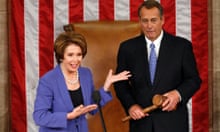John Boehner was almost certain to be re-elected for another term as speaker of the House of Representatives on Wednesday, despite a rancorous end to the fiscal cliff crisis and fury among some fellow Republicans over his failure to schedule a vote on relief funds for Hurricane Sandy victims.
As the 113th Congress was due to be sworn in, it looked likely that Boehner would be unopposed. But he was unlikely to secure the unanimous support of his party he enjoyed last time round: at least one Republican has gone on the record to say he will not vote for him.
Some of his House colleagues hold personal grudges, having been removed from committee jobs, and some are simply disenchanted with his performance.
But others who had earlier threatened to vote against him, such as the New York congressman Pete King, have come round, in King's case because Boehner relented and scheduled a vote on Sandy aid for Friday.
"John will be re-elected Speaker. John is a voice of reason in our conference, despite some of the things I said yesterday," said King on NBC on Thursday morning.
The failure of Bohener to schedule a vote on Sandy aid this week drew a furious response from the Republican governor of New Jersey, Chris Christie. In a 40-minute news conference on Wednesday, Christie railed against the "toxic internal politics" of the House majority.
After Christie's comments, Boehner and House majority leader Eric Cantor hurriedly announced there would be two votes on Sandy aid: one on Friday, which will release $9bn for the national flood insurance programme, and another in the first full business day of the new Congress, on 15 January, for a remaining $51bn in the package.
Boehner and Cantor met members on Congress from Sandy-affected areas on Wednesday in an attempt to assuage their concerns. "Getting critical aid to the victims of Hurricane Sandy should be the first priority in the new Congress, and that was reaffirmed today with members of the New York and New Jersey delegations," Cantor said after the meeting.
The 113th Congress is more diverse than the 112th in terms of race, gender and sexual preferences, but the political make-up is not significantly different. There are a few more Democrats in the Senate and House and fewer Tea Party-backed Republicans in the House, but overall the balance remains much the same.
That means the 113th Congress could end up being as unproductive as the 112th, dominated by new showdowns over spending cuts and raising the debt ceiling, eating into time Barack Obama wants for his ambitious programme that includes immigration reform and gun control.
The new Congress begins with a rollcall vote for new members followed by a swearing-in ceremony at noon. There will be 82 new members in the House and 12 in the Senate.
Among members of Congress departing are Ron Paul, the libertarian who fought for the Republican presidential nomination last year, Dennis Kucinich, who sought the Democratic presidential nomination in 2008, and senator Jim DeMint, the godfather of the Tea Party.
The new Congress will see white men as a minority among House Democrats, reflecting the increase in the ranks of women and Latinos. But a more balanced Congress still has a long way to go, with only one black senator, Tim Scott, who replaces DeMint who has opted to stand down without completing his term.
The new Congress has a Hindu, a Buddhist – and the return, after a short gap, of a Kennedy, Joseph. Democrat Tammy Baldwin is the first openly gay candidate elected to the Senate.
Democrats Tammy Duckworth and Tulsi Gabbard will be the first female combat veterans to serve in Congress.





Comments (…)
Sign in or create your Guardian account to join the discussion